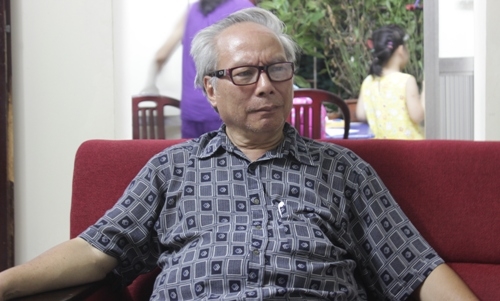.jfif) Opinion
Opinion

Professor Lê Viết Khuyến, a member of the Association of Việt Nam’s Universities and Colleges, speaks to the Khoa học & Đời sống (Science and Life) newspaper about the fight against corruption in higher education.
 |
Professor Lê Viết Khuyến, a member of the Association of Việt Nam’s Universities and Colleges, spoke to the newspaper Khoa học & Đời sống (Science and Life) about the fight against corruption in higher education.
What’s your point of view on the comment that Vietnamese students studying abroad at their own expense or on Government scholarships should be investigated as to where the money came from?
In my opinion, I totally support Government officials’ decisions to send their offspring to study abroad. But, what I want to question here is how those officials have big sums of money to achieve this. I’m pretty sure, with their monthly salaries and other sources of income; they would not be able to afford to send their children to study abroad.
Nowadays, many Government officials have sent their children overseas with a Government scholarship. Every year, the Government grants many scholarships to students who have excelled in their studies. And I support such a policy. But among the students receiving scholarships are those who have not done so well, but they are the sons or daughters of high-ranking Government officials. These are signs of corruption!
For students studying abroad on their own, I think that the Government should ask their parents to declare their assets to ensure that the money they spend on their children is legal money from their own assets or “clean money”.
Is it written into law that Government officials sending their children to study abroad have to justify where the money came from?
There is no law prohibiting Government officials from sending their children to study overseas. But, under the Anti-Corruption Law, all senior Government officials have to make their annual asset declarations. This is one way to make society clean and transparent.
Do you have any children studying abroad?
Yes, I do.
My child won a scholarship to study abroad when I was working at the Ministry of Education and Training.
He sat for an examination and won an ASEAN scholarship to study in Singapore.
I’m very proud that his winning the ASEAN scholarship was on his own, not with my influence.
Do you think that some people have used their influence to seek scholarships for their children? Should these cases be considered “policy corruption”?
I can’t agree more.
To my knowledge, quite a few students were not qualified for Government scholarships to study abroad, but they were awarded anyway. So, we can use the phrase “policy corruption” for these cases.
Based on what you have mentioned above, should we monitor both self-financing students and scholarship students who are the children of senior Government officials?
Yes, we should review our current policies on awarding scholarships to students. An important guiding principle in awarding the scholarship is based on a level playing field for all candidates.
For students who are the children of Government officials going abroad to study on their own, we should make a rule that all parents have to declare the source of money they spend on their children’s education abroad. This is the best way to ensure success in the fight against corruption. — VNS




